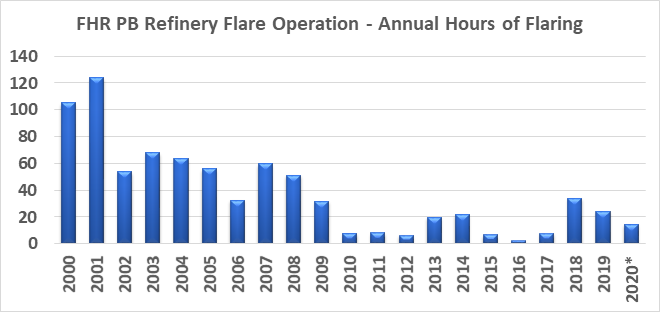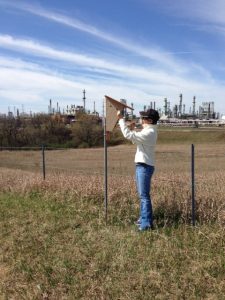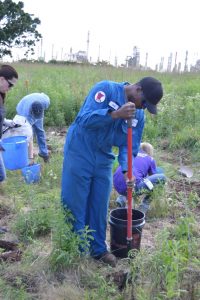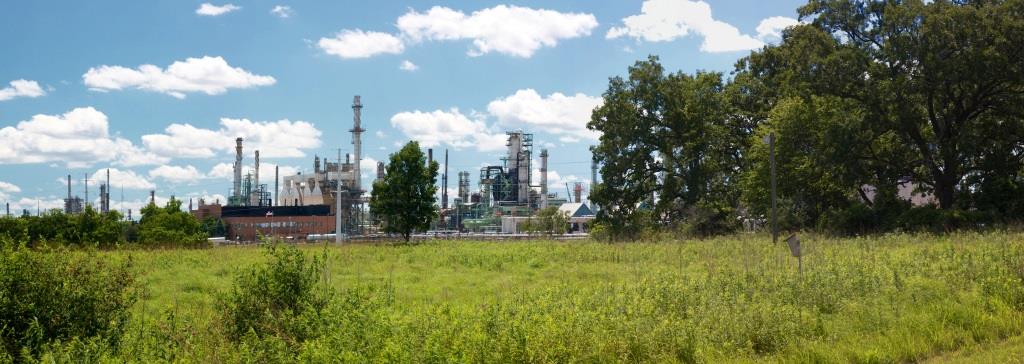Environment, health and safety
Using fewer resources, minimizing impacts to the environment and keeping people safe are the top priorities of the Pine Bend refinery. Our refinery is one of the safest and most efficient refineries operating in the United States, and it continues to improve.
The products we produce, such as transportation fuels and the wide array of coproducts that come from refining petroleum, are foundational to the economy. It’s important that we innovate and continuously improve our products and how we make them.
From our daily operations to the selection, design and execution of projects, we constantly strive to use fewer resources, eliminate waste and minimize the emissions associated with the products we make.
Since 2000, the refinery has reduced its traditional criteria emissions 70% while increasing production to meet demand. The refinery has reduced total on-site emissions in 11 of the last 15 years and its emissions per barrel are approximately 20% lower than other U.S. refineries. Pine Bend is a certified ENERGY STAR® facility by the U.S. Environmental Protection Agency (EPA) and recently unveiled what is believed to be the largest solar installation in the country that is designed to directly power a single facility or business. In the past five years, the refinery has improved its energy efficiency by 10%, advancing it into the top quartile of all U.S. refineries.
In 2021, the Flint Hills Resources Pine Bend refinery was awarded the EPA’s ENERGY STAR® Partner of the Year Award in recognition of its superior energy management practices. This is the second time Flint Hills and other Koch companies have earned the award – the highest honor bestowed by the EPA for energy performance. In 2016 Flint Hills Resources Pine Bend refinery was recognized by the Association of American Railroads as an exemplary shipper, and in 2014 Pine Bend became the first facility in the country to be certified as a PRO-10 worksite. The refinery received the Governor’s Safety Award from the Minnesota Safety Council for the sixth time in 2014.
The Minnesota Pollution Control Agency has recognized the Pine Bend refinery as an outstanding wastewater treatment operator 14 of the last 17 years.
For more information about Flint Hills Resources and our parent company’s approach to environmental, social and governance stewardship, please visit KOCHind.com.
There is nothing more important than the health and safety of our employees, contractors and neighbors. A strict adherence to safe work practices and the use of proper personal protective equipment is a base expectation at the Pine Bend refinery. Technologies such as advanced automation, remote sensor monitoring and machine learning also help make our facility safer.
Pine Bend has decreased OSHA-recordable injuries by more than 73% in the past 15 years and has surpassed 2 million workhours in recent years without a recordable injury.
In 2017 Flint Hills Resources Pine Bend refinery received two awards for strong rail safety performance including the Chemical Safety Excellence Award from CSX Corporation and the Thoroughbred Chemical Safety Award from Norfolk Southern Corporation. In 2016 Flint Hills Resources Pine Bend refinery was recognized by the Association of American Railroads as an exemplary shipper, and in 2014 Pine Bend became the first facility in the country to be certified as a PRO-10 worksite.
The refinery received the Governor’s Safety Award from the Minnesota Safety Council for the sixth time in 2014. Pine Bend also received numerous safety awards in recent years from the American Fuel & Petrochemical Manufacturers.
The Pine Bend refinery is an industry leader in flare management. Flares are essential pieces of safety equipment used to burn excess gases that can otherwise build up in the pipes and towers of a facility when it shuts down, loses power, or has other technical issues. Flint Hills Resources has invested in new technology – a flare gas recovery system – to greatly reduce its flaring by recovering excess gases that would otherwise be flared and cycle them back through their processing units.
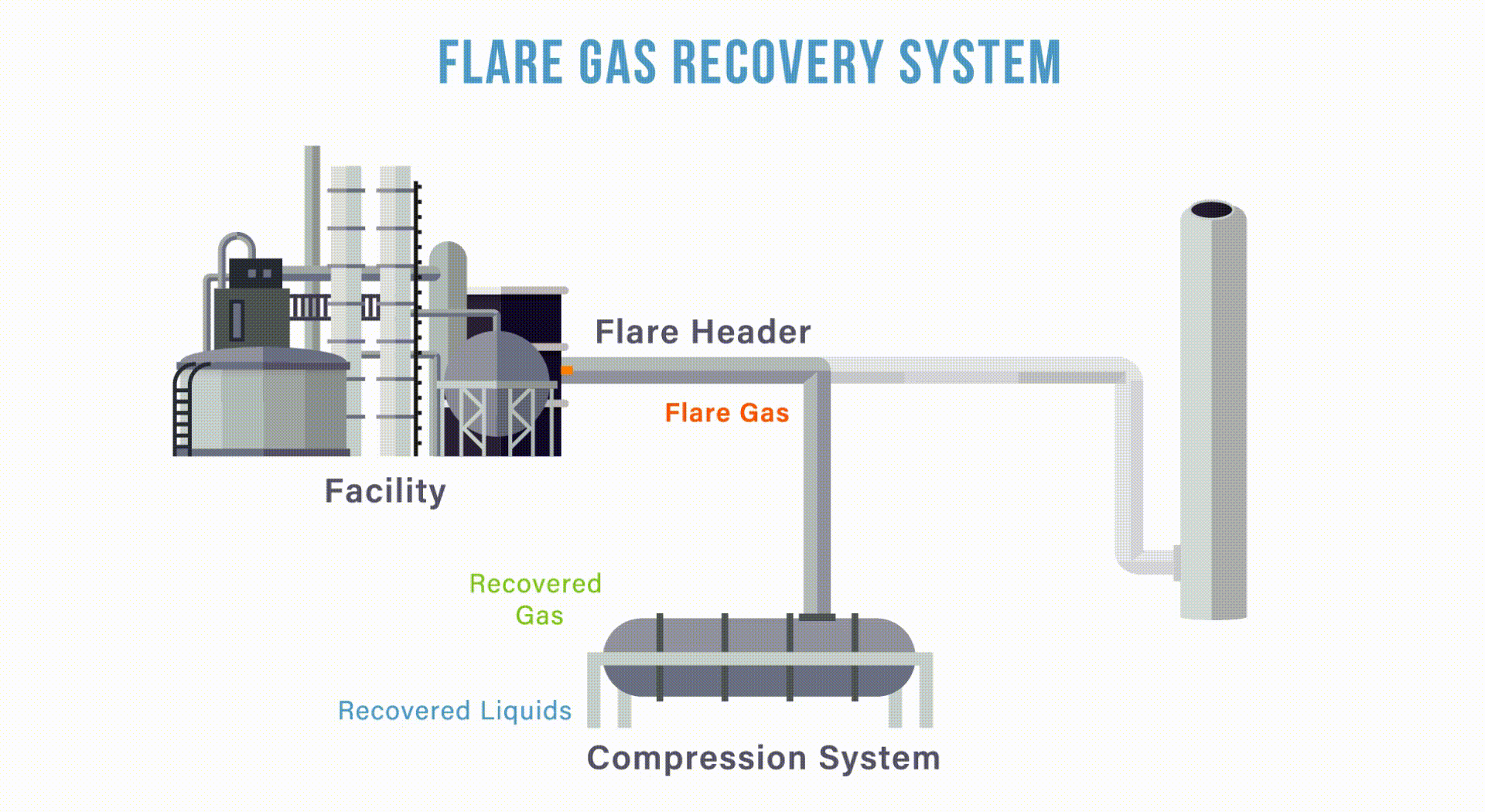
The Pine Bend refinery began a water recycling program in 2006 that enables it to reuse treated water. The refinery’s wastewater treatment plant successfully processes 3.5 million gallons of water per day. The Minnesota Pollution Control Agency has recognized the Pine Bend refinery as an outstanding wastewater treatment operator for the past 14 of the last 17 years. The refinery has reduced its water use to just over half a gallon for every gallon of product produced.

Pine Bend is a certified ENERGY STAR® facility by the U.S. Environmental Protection Agency (EPA). In the past five years, the refinery has improved its energy efficiency by 10%, advancing it into the top quartile of all U.S. refineries. In 2021, the Flint Hills Resources Pine Bend refinery was awarded the EPA’s ENERGY STAR® Partner of the Year Award in recognition of its superior energy management practices. This is the second time Flint Hills and other Koch companies have earned the award – the highest honor bestowed by the EPA for energy performance.
The Pine Bend refinery is a member of Clean Air Minnesota, a group of businesses, units of government, and environmental organizations that was convened by Environmental Initiative to develop a set of strategies to clean up the air through proactive, voluntary approaches.
In addition, Pine Bend is a founding sponsor of Project Green Fleet, a collaborative effort with Environmental Initiative to install pollution control equipment in thousands of Minnesota school buses, heavy-duty trucks, and other diesel vehicles. Since the effort was kicked-off in 2005, Project Green Fleet has modified more than 3,200 Minnesota school buses and 1,300 diesel trucks with improvements that reduce diesel emissions and help keep Minnesota’s air clean. In 2014, Project Green Fleet completed its successful school bus retrofit program and launched a new major initiative to reduce emissions from Minnesota diesel construction vehicles, marine engines, rail equipment, and other heavy-duty diesel vehicles, thanks in part to a $1 million grant from Flint Hills Resources. The project was recognized by the EPA as a national model for improving air quality and earned one of two national Clean Air Excellence Awards.
Since 2000 Flint Hills Resources Pine Bend has partnered with Friends of the Mississippi River and Great River Greening to restore hundreds of acres of natural prairie and oak savanna in an area known as the Pine Bend Bluffs Natural Area along the Mississippi River. The area provides critical habitat for both resident and migratory animals and is a migration corridor for millions of songbirds and 40% of North America’s waterfowl and shorebirds. During the last nine years, 113 different species have been spotted at the Pine Bend Bluffs, of which at least 70 are likely breeding.
The area also provides habitat for one of the rarest bee species: the rusty patched bumble bee. In August, a lone male rusty patched bumble bee was discovered to have made the Pine Bend Bluffs Natural Area savanna its new home. Federally endangered, this individual pollinator represents approximately 0.2% of the known population of rusty patched bumble bees in the world, according to 2018 statistics.
Restoration efforts have focused around the protection and enhancement of native prairie plants with prescribed burns and the removal of invasive plants, helping to restore the area to pre-settlement conditions. To date, volunteers have restored more than 200 acres. In 2020, 89 acres of bluffland were managed.
Pine Bend Bluffs by the numbers (2020)
- 27 species of bees and butterflies found
- 37 acres of woodland and oak forest maintained
- 7 acres of newly restored prairie
- 35 acres of restored prairie and savanna
- More than 18 acres of buckthorn cleared

These before and after photos show a four-acre non-native wooded area that Flint Hills Resources employees and volunteers worked to restore in 2017. The area is now free of invasive species and will be seeded with wildflowers for pollinators.
The Pine Bend Bluffs Natural Area is an Environmental Initiative award winner for natural resource protection and is designated as an area of outstanding biological diversity by the Minnesota Department of Natural Resources. The Pine Bend Bluffs are Certified Gold by the Wildlife Habitat Council through its Conservation Certification® program, a voluntary sustainability standard for habitat and species management and conservation education on corporate land holdings. For more than 20 years, Flint Hills and its volunteer partners have worked to maintain and improve this important habitat. Learn more in this video.
Learn more about this effort in the Friends of the Mississippi River’s 2023 Ecological Activities Report.
Flint Hills Resources partners with environmental organizations to help restore the Pine Bend Bluffs to pre-settlement conditions and support natural wildlife habitats. Efforts include facilitating bluebird nesting, building snake hibernacula, and planting native plants to support monarch butterflies, among other initiatives.
In 2016, Flint Hills Resources started construction on a new state-of-the-art combined heat and power (CHP) system that will allow it to operate more efficiently while reducing greenhouse gas emissions from Minnesota’s current energy supply mix. The CHP system will use natural gas and a heat recovery process to produce approximately 50 megawatts of electricity, or roughly 40% of the energy required to power the refinery.
Since 2008, Flint Hills Resources has planted 500-1,000 trees in Dakota County each year that are native to Minnesota. Many of these trees are located near area parks and help fill in the natural flyway areas that birds use for migration.
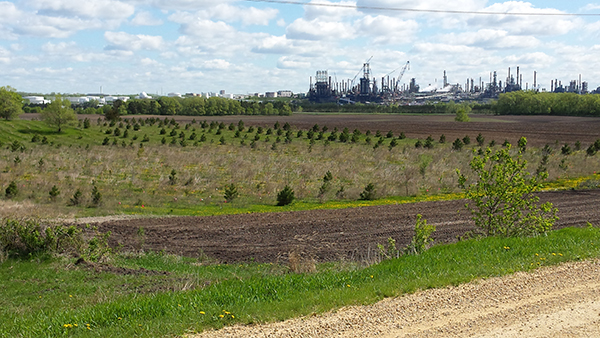
 Flint Hills Resources maintains a fully functioning, two-house fire department at the Pine Bend refinery. The fire department’s 132 crew members, including 87 refinery volunteers, receive ongoing training on all aspects of industrial emergency response and battle live, pressurized petroleum fires at an onsite training center. The Pine Bend Fire Department also provides mutual aid industrial fire training to the Rosemount, Eagan, Inver Grove Heights, and Hastings fire departments.
Flint Hills Resources maintains a fully functioning, two-house fire department at the Pine Bend refinery. The fire department’s 132 crew members, including 87 refinery volunteers, receive ongoing training on all aspects of industrial emergency response and battle live, pressurized petroleum fires at an onsite training center. The Pine Bend Fire Department also provides mutual aid industrial fire training to the Rosemount, Eagan, Inver Grove Heights, and Hastings fire departments.

